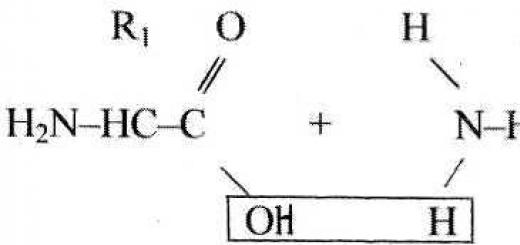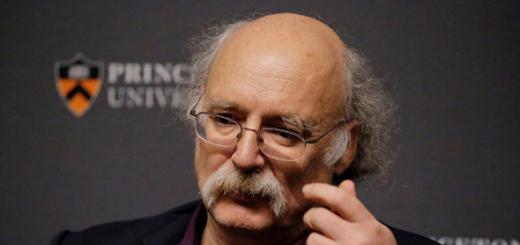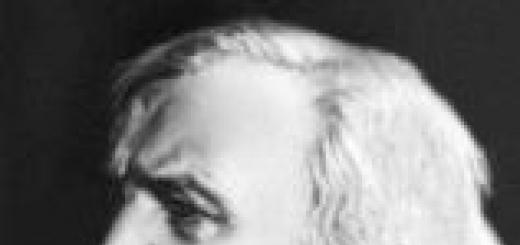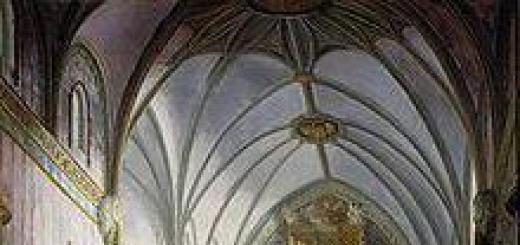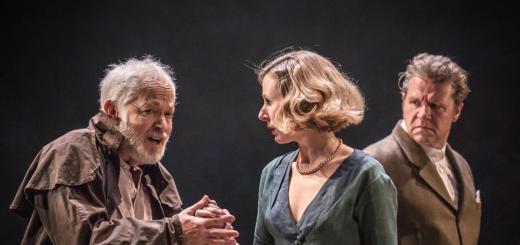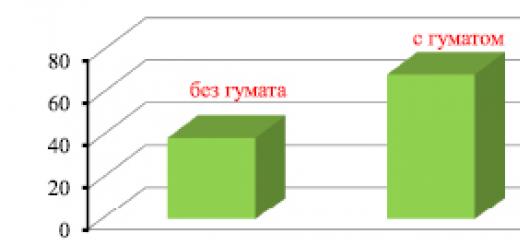Village of Konstantinovo. Yesenin's house
At the age of 17 Yesenin - graduate of the church teachers' school. But teaching doesn't appeal to him.
The realization of his poetic gift came quickly. He later recalled: “For 18 years I was surprised when I sent my poems to editorial offices that they were not published, and unexpectedly came to St. Petersburg. I was received very cordially there.”
He came to St. Petersburg as a very simple-minded guy. Subsequently, he himself said that when he saw Blok, he began to sweat from excitement. In those years, the still fledgling Yesenin was an obedient companion of Klyuev and Gorodetsky. Along with them, he walked around like a sort of tin-leaf peasant, wearing smart morocco boots, a blue silk shirt, belted with a gold cord, on which hung a comb for combing his youthful curls, scaring away people with taste with his appearance.
Yesenin and Klyuev
Yesenin’s first collection of poems, “Radunitsa,” was published in 1916.
At the heart of Yesenin’s early poetry lies a devout, almost religious love for native land. It is to the native peasant land, and not to Russia with its cities, factories, universities and theaters, with political and social life. In this sense, he essentially did not know Russia and was not interested in it. For him, his homeland for now is his native side with its fields and forests, and not a country, not a state.
In the first half of 1916, Yesenin was drafted into the army. Thanks to the efforts of his friends, he received an appointment as an orderly on the Tsarskoye Selo military hospital train No. 143, where the empress and princesses served as nurses.
Yesenin among the military ambulance train.
At one of the concerts in the infirmary, he met with Empress Alexandra Feodorovna. Yesenin recalled in his autobiography: “After reading my poems, she said that my poems are beautiful, but very sad. I told her that all of Russia is like that.” The proof of his second book, “Dove,” contained a whole cycle of poems dedicated to the empress. But after the revolution, Yesenin withdrew these dedications.
Yesenin's early poetry— This is still essentially a popular print, striking the eye with vivid images and metaphors. There is a smoky touch of sadness in it, but there is no anxiety, no strain. The revolution will make him a great tragic poet.
***
Yesenin initially accepted the revolution enthusiastically. He expected that peasant Rus' with its eternal truth would fly out of this flame like a fabulous firebird. In 1918-1919, several revolutionary poems came from his pen, including “Inonia” with its aspirations for the coming universal renewal. At this time, Yesenin flaunts his acquaintance with the leaders of the Cheka and even invents a new way of meeting girls, inviting them to the Lubyanka basements to watch the executions.
However, very soon he realizes that the Bolsheviks— not at all who they would like to pretend to be. The mood of elation is replaced by confusion and bewilderment at what is happening.
Yesenin reads poetry at a rally.
"I am the last poet of the village"— writes Yesenin in a poem from 1920. But the village did not live up to expectations. Due to human weakness, he also places the blame on the “city”, on urban culture, with which the Bolsheviks, in his opinion, are poisoning rural Rus'. It seems to him that the car running from the city is to blame, blowing the “disastrous horn”; he curses the rushing train, which the foal is so funny and stupidly chasing.
And the result is depressed state: “There is no love, neither for the village nor for the city.”
At this time, Yesenin was already drinking heavily, often falling into a riot; his poems contained motifs of hopeless loneliness, drunken revelry, hooliganism and a ruined life. But with this rot, with the city hooligans, Yesenin still has an easier time than with the prosperous townsfolk Soviet Russia. Now the Bolsheviks have become disgusting to him, his former friends from the Cheka are disgusted:
I am not a villain, and I did not plunder the forest,
He didn’t shoot the unfortunate people in the dungeons.
One of his last major works was the poem “Land of Scoundrels,” in which he denounced the Soviet regime. After this, persecution began against him in the newspapers. The last two years of Yesenin’s life were spent in constant travel: hiding from prosecution, he travels to the Caucasus three times, goes to Leningrad several times, and Konstantinovo seven times. For some time now, almost every poem of his began to end with a prediction of imminent death:
My friend, my friend! Ages that have matured
Only death closes.
The eyelids have seen the light. But Yesenin, who had regained his sight, did not want to see what was happening around him. There was only one thing left for him to do: die.
***
At the end of November 1925, due to the threat of arrest, Yesenin had to go to a paid psychoneurological clinic at Moscow University, where Professor Gannushkin provided him with a separate room.
The GPU and police officers went crazy looking for the poet. Only a few people knew about his hospitalization in the clinic, but informants were found. On November 28, security officers rushed to Gannushkin and demanded Yesenin’s extradition. The doctor responded with a firm refusal. Then the clinic was placed under surveillance. After waiting a moment, Yesenin secretly leaves the hospital and leaves for Leningrad on December 23. On the night of December 28, he was found dead in his Angleterre hotel room. The surviving evidence still does not allow us to make an unambiguous medical verdict on whether the poet’s death was a suicide or the work of the Soviet secret services, who staged the murder as a suicide. http://kp.by/daily/23609.3/46548/
Yesenin's body was transported to Moscow for burial at the Vagankovskoye cemetery. The funeral was grandiose. According to contemporaries, not a single Russian poet was buried this way.
Yesenin's funeral. Funeral meeting at the Pushkin monument
Today it is already clearly visible that Yesenin’s history is the history of the errors of his time. He believed that the Bolshevik revolution was the path to renewing Russian life, but it turned out to be the path to the destruction of peasant Rus', which he so sincerely and sincerely loved. He renounced God in the name of love for man, and this “liberated” man did nothing but remove the cross from the church and hang Lenin instead of the icon.
And, however, above all the delusions and all the downfalls of Yesenin’s life, there remains something that deeply attracts him. The beautiful and noble thing about Yesenin is that he was infinitely truthful in his work, that he was not afraid to admit mistakes - and wanted to pay the final, terrible price for everything. His truth is love for his homeland, albeit blind, but great:
I love my homeland
I love my homeland very much!
His misfortune was that he was never able to name it, this homeland: he sang of the log, peasant Rus', and the socialist Inonia, and the Asian Scattering, he tried to accept not with his heart, but with his mind even the USSR - the correct name alone did not came to his lips: Russia. “A sixth of the earth” as a state and cultural-historical phenomenon remained unknown to him. This was his main delusion, not ill will, but a bitter mistake. Here is the beginning and end of his tragedy.
Original article on my website " Forgotten stories" (The World History in essays and stories)
Sergei Yesenin not only wrote about the war. He participated in it as an orderly on an ambulance train, which went to the front several times from Tsarskoe Selo, where he served in hospital No. 17 from April 1916 to February 1917. The poet not only read and heard about the suffering of people at the front, but also with his own I saw them with my own eyes, as the wounded were taken to the ambulance train, and his duty was to write down their names. Here they were given first aid, and the seriously wounded were sent to the hospital. He also saw those killed, and some died in his presence. They were immediately buried in pits. That is, he himself was on the roads of war.
These impressions, of course, were reflected in his work. In particular, it is especially vivid in the poem “Anna Snegina”. I quote: “And how many unfortunate monsters and cripples are now due to the war. And how many are buried in the pits. And how many more will they bury.” That's how it was in the first world war, in which Yesenin participated.
People experienced even more suffering during World War II. In our country it is called the Great Patriotic War. And the poetry of Sergei Yesenin helped to endure these torments easier. Many people wrote about how this happened, but only two published a separate book (as far as I know): our fellow countryman, writer Valentin Safonov, and a member of the Yesenin society “Radunitsa”, front-line soldier Boris Styrikovich.
I have them both in my personal library. Moreover, the second one was given to me by the author himself in his apartment and with his autograph on July 27, 2004 in St. Petersburg. The first was published in 1995 under the title “Yesenin on the fronts of the Great Patriotic War...”. She is very emotional and literary. Of course, the professional writer Safonov writes better and more vividly, but in terms of content I liked Styrikovich’s book “With Pushkin and Yesenin along the fiery roads of the Great Patriotic War” more. Patriotic War" There's so much more to it interesting facts than the writer. He not only saw a lot himself, but also used a wealth of information from the funds of the Yesenin Museum-Reserve, old newspapers, meetings with front-line poets, etc.
As Styrikovich writes: “I read poems to tank crews in January 1943 during the breakthrough of the siege of Leningrad, to artillerymen at the beginning of 1944 during the complete liberation of Leningrad from the siege, and read them in hospitals where I ended up after being wounded. Yesenin’s poems often brought tears to our eyes: “as if he was writing for us.” The fighters especially liked “Letter to Mother,” which they often sang in chorus. Several folklore texts of the poem have survived. Here is one of them:
"And to you in the evening blue darkness
Suddenly it seems like a terrible moment,
Like a German in hand-to-hand combat
He pushed a sharp bayonet under my heart.”
As the Latvian literary critic E. Meks (now deceased, also an old friend of mine) reported, one of these texts was created by Russian people deported to Germany:
Hello, mother! Greetings from your son.
Your son is writing to you from afar.
I live, but my life is broken,
Lonely, boring and bitter.
They brought me to a foreign country
With a lonely wild head,
And they ruined my young life,
Separated from you, Mama.
In the State Museum-Reserve S.A. Yesenin in Konstantinov on a special stand there are entire collections of Sergei Yesenin copied in notebooks and individual poems that went with their owners through the fire of war.
There are many of our fellow countrymen among them. I.M. left his entry in the museum’s visitor book. Blinov from the village of Dashkovo-Pesochnya, which is now part of the city of Ryazan. He said that during the war he always carried a volume of Sergei Yesenin’s poems in his duffel bag: “I read his poems to the soldiers in the trenches, and how they envied me that I was also from Ryazan.”
A resident of Ryazan, I. Gilyarov, went through the entire war with Yesenin. In moments of danger, instead of praying, he repeated Yesenin’s poems to himself. And he came back from the war unharmed. This means Yesenin helped. The front-line soldier recalled: “In moments of calm, one of the comrades came up and asked to read Yesenin. And I read what I remembered from the pre-war years.” Before any difficult task, the company commander called him: “The matter is serious. Get the guys in the mood." And I read Yesenin. The order cannot be ignored."
Veteran of the Great Patriotic War Alexander Frolov, a member of our literary association "Pereyaslavl", in the story "Meeting in Seltsy" writes that who was there military unit supplied Yesenin's mother with firewood at the beginning of the war.
During the war, our troops often passed through Konstantinovo to the west. Rests were arranged in the village. And many soldiers and officers took a handful of earth from the poet’s yard, as a symbol of the Motherland, which they would defend.
Yesenin's collections were also published during the war. Both here - in the Soviet Union, and abroad, even in German-occupied territory.
As noted by the former chairman of the Yesenin society “Radunitsa” N.G. Yusov (now deceased, one of my old acquaintances), in 1943 State Publishing House fiction in Moscow published a hardcover collection of poems by Sergei Yesenin on 576 pages with a circulation of 25,000 copies.
According to B. Styrikovich, individual poems by Yesenin were published in 1942 and 1943 in London in three anthologies of Russian poetry on English language. Several collections were published in the occupied territory.
The first one was published in Odessa in January 1942. As Boris Styrikovich suggests,
the collection was published by partisans in the Odessa catacombs. In 1944, Yesenin was released in occupied Minsk and Riga. Styrikovich describes the Riga collection in detail, Yusov describes the Minsk collection. But this topic is for a special article.
Both V. Safonov and B. Styrikovich write about the fate of poets who ended up at the front. Both name the poet Grigory Lyushnin from Rybny, Ryazan region. In the 60s, some newspapers wrote about the poems of an unknown prisoner fascist concentration camp. They thought he was dead. But he turned out to be alive and returned home. It was Grigory Lyushnin. Captured at the beginning of the war, he ended up in a concentration camp. There I read Yesenin’s poems to my fellow prisoners. With this, he admonished those who, out of hunger and deprivation, wanted to join Vlasov’s army.
Boris Zhavoronkov is a front-line poet with the happiest fate of all Ryazan poets. He not only remained alive, but also published several collections of poetry and even a collection of essays in 9 volumes. He, according to Styrikovich and Safonov, wrote more successfully in verse about the significance of Sergei Yesenin’s poetry for front-line soldiers than others. They quote the same poem by Zhavoronkov. It is, in my opinion, the best on this topic.
Rushing through the smoke on parachute lines,
I won't lie a single word:
We read your poems in the trenches,
They were stored like cartridges and terry.
We carried them in handwritten lists,
I remember how the platoon commander read them.
Peasant son, you loved Russia so much,
That the world called you a singer!
Your traces are in the daisies by the backwater.
Your poems are like the morning bell,
Sometimes they smell like rye, sometimes they fall from maple trees,
Then they float like a rainbow near the villages.
Not all words are sung from the heart -
The drafts remained on the table...
Life is immortal: Ryazan poets
They sing about your land today.
As Styrikovich writes, S. Yesenin’s son Konstantin actively participated in the Great Patriotic War. Konstantin Sergeevich volunteered for the front in November 1941. He was a defender of Leningrad. He was wounded four times and became a war invalid. The case of Constantine’s heroic deed is widely known. The commander was killed in the battle and his deputy was seriously wounded. Yesenin was appointed commander. He rushed to attack. At the enemy trench he was hit by a bullet and fell. His family was informed of his death. This was written about in the newspaper. But he survived and continued to fight. For military services he was awarded three Orders of the Red Star and the Order of the Patriotic War, first degree.
Boris Styrikovich cites the memoirs of Konstantin Yesenin: “It is not easy to go through life with the surname Yesenin. With her, I was able to better see what a difficult but glorious path my father’s poems and his name took. And I know for sure that the question that tormented Yesenin in recent days - is his poetry needed - received a decades-tested answer: yes, it is needed!
In Styrikovich’s book, a poem-memoir of our fellow countrywoman Vera Bezvodskaya is quoted:
“I read Yesenin to the soldiers,
And every verse sounded like a hymn to life.
In a dugout under a log ramp
The lamp in the sleeve was emitting the sun.
The village verse will melt like an accordion
Or a flute will yearn in the semi-darkness:
“The golden grove dissuaded me”
Or “don’t be so sad about me”...
She was the “daughter of the regiment” at the front, and after the war she became a member of the Ryazan Springs literary association.
About a remarkable incident related to Yesenin’s poetry and the name of the Hero Soviet Union the legendary submarine commander A. Marinesko, described in detail in the book by V. Safonov and more briefly by Styrikovich. I will quote Styrikovich in abbreviation: “The year was 1942. The submarine entered the Malaya Neva for the winter and stood directly opposite the Institute of Russian Literature. The sailors were admitted to the Pushkin House Museum and were allowed to use the library. V.A. often talked with the crew. Manuilov, who at that time headed the institute, personally knew Yesenin well and dedicated a poem to him, which contains the following lines:
And now I am awakened by your dawn,
I'm seething with your verses,
I immediately realized: I need you,
Like air, sun and earth.
Soon the boat left for a combat mission, and the sailors realized that they needed Yesenin as much as they needed air, sun and earth. At an emergency pace, in one night, the first volume of the poet’s works of 1926 was retyped on a typewriter. And Yesenin’s unusual blockade “edition” went to the front. Subsequently, there was the sinking of a large liner and a cruiser, with which many thousands of Nazis went to the bottom. The Ryazan poet A. Potapov wrote amazing poems in honor of the sailors’ feat:
The Baltic has never seen such victories,
The enemy has paid in full for everything.
Germany, like an octopus, lay in darkness,
Everyone is immersed in three days of mourning.
...The moon medal is polished to a shine,
And the ninth wave is not afraid of adversity.
So together with the crew of Marinesco
Yesenin fought with the fascists.
In his book, Styrikovic writes about poetry evenings during the war. He publishes the memoirs of war participant A. Dukhanin about the evening in memory of Yesenin at the beginning of 1943 in Moscow, in the House of Scientists: “The auditorium is crowded... And now on the stage is Kachalov. We eagerly listened to the lines. Whatever line came from Kachalov’s lips, we perceived it as a command to us, going to the front, to defend our Motherland and prevent the enemy. It seemed that the worries of the unsettled life of wartime disappeared, clearing the way for the purest and brightest feeling - the ardent love for the Fatherland, which Yesenin expressed with such force:
But most of all, love for the native land
I was tormented, tormented and burned...
None of the great poets shocked me as much as Yesenin.”
I can’t help but say that my father also took to the front the collection of Sergei Yesenin, published in the Small Series of the “Poet’s Library” in 1940. The fate of the collection is interesting. In the summer of 1940, a young officer arrived from Moscow to Sakhalin, where my father served, and brought Yesenin’s newly published book. And in 1942, leaving for the Stalingrad front, he gave it to my father. Unfortunately, the collection was stolen from my father’s field bag.
Even more interesting is the fate of the same collection Nobel laureate A. Solzhenitsyn. He also took his Yesenin collection to the front and managed to preserve it during two years of fighting (from 1943 to 1945). In February 1945, he was arrested, but the books and manuscripts of the future writer were not lost. They were hidden in a hollow tree by his subordinate senior sergeant Solomin. The most amazing thing is that they were preserved and in 1966 they were handed over to him by A. Solzhenitsyn, including Yesenin’s volume.
This is how Sergei Yesenin’s poetry helped our soldiers survive the brutal war against fascism!
Literature:
Safonov V.I. Yesenin on the fronts of the Great Patriotic War... - Ryazan: New Time, 1995. – 72 p.
Styrikovich B.V. With Pushkin and Yesenin along the fiery roads of the Great Patriotic War. – Frontline lyrics. Book of prose. St. Petersburg: ASSPIN, 2003. – 64 p.
Pavlov O. SECOND WORLD WAR: STARTING POINT. – Moscow: Arguments of the Week, 2014. – July 31. – P. 7.
Sergei Yesenin is one of the founders of the peasant trend in Russian literature. In his work one can highlight love lyrics, where the theme of the Motherland and the theme of nature are closely intertwined, where philosophical motives are strong. However, many of his poems are devoted to the theme of war, which he saw with his own eyes. We decided to list them in one collection.
- "Mother's Prayer". The poet's most popular and memorable poem about the war. The reader feels the grief of a mother who worries about her warrior son. This work can rightfully be considered one of the most insightful on the topic of maternal love not only in the work of Yesenin himself, but also in the entire treasury of Russian literature. Read the text of the verse...
- "Memory". The title of the poem speaks for itself: Yesenin recalls a terrible event in the life of his people - October Revolution 1917. “Darkened Petrograd” appears before the poet’s gaze; he feels anxiety for the future of his fellow citizens. It is not for nothing that many believe that a civil war can be worse than a struggle between different states, because it is a split within a single people. Read the text of the verse...
- "Country of Scoundrels". This poem by Yesenin is also dedicated to the theme of the civil war. At that time Russia was experiencing transition period which promoted pluralism public opinion. The poet shows many interesting personalities born of the revolution: the anarchist bandit Nomakh, the communist-sympathizing volunteer Zamarashkin, and the Bolshevik commissar Chekistov. Everyone has their own view on the development of the fatherland, but in reality, unfortunately, everyone turns out to be scoundrels. Read the text of the verse...
- "Belgium". One of the poet's most optimistic poems about a country that has suffered a war. Yesenin’s admiration for Belgium is felt: even if she is defeated, she is “not a slave,” her “soul,” even in the light of the troubles she has suffered, is still “pure as snow.” The poet’s work includes works “Greece” and “Poland” with similar themes. The first country attracts Yesenin with its history: the mythical characters Achilles and Hector are mentioned, the reader sees the battle of Troy. He called the second country a “bright dream”; the poet believes in its victory over bloody captivity. However, it is in “Belgium” that one feels admiration for the proud power: it is called “brave”, and its spirit is “free” and “mighty”. Read the text of the verse...
- "The Ballad of Twenty-Six" It is dedicated to the sixth anniversary of the execution of the Baku commissars. Again in Yesenin’s work the ominous year of 1918 arises - the year of a bloody rebellion, atrocities and innocent victims. The poet addresses the artist Yakulov, the author of the project for the monument to the 26 Baku commissars in the capital of Azerbaijan. The lines about terrible injustice are repeated as a refrain: “There were 26 of them. 26. The sands cannot cover their graves.” It is noteworthy that, according to eyewitness P.I. Chagina, the ballad was written in one night. Read the text of the verse...
- "Heroic whistle." Even in Yesenin’s war poems his love for nature is clearly visible. In the poem “The Heroic Whistle,” the image of the oak tree is especially interesting: it is with its help that the poet wants to show the power, strength, and steadfastness of the Russian people. This work can be put on a par with folk songs or Russian epics.
Russia is preparing to celebrate the 120th anniversary of Sergei Alexandrovich Yesenin. Probably the most popular Russian poet of the twentieth century. As great as it is tragic. Much has been written about Yesenin’s difficult fate, which is reflected in his poems. What was the main tragedy of the poet? In his wild character, many reckless actions, for which he later repented in poetry? Of course, this too. But many of us are familiar with this - messing things up and then regretting them. We can say that this is one of the traits of the Russian character, which was quite inherent in Yesenin. However, this was hardly the main tragedy poet.
Sergei Alexandrovich madly loved his homeland. Love for Russia, for Rus', is one of the main themes of his works. What was the Motherland for the poet, what did he mean by this concept?
Maybe power, or, as they say now, “the system”? Yesenin really looked with great hopes at the revolutionary events in Russia and the construction of the coming “new world.” However, as often happens, dreams gave way to disappointment:
I believed... I was burning...
I walked with the revolution
I thought that brotherhood was not a dream or a dream,
That everyone will merge into one sea -
All the hosts of peoples,
And races and tribes.
Empty fun.
Just talk!
At the same time, Yesenin was treated kindly to some extent Soviet power, and he himself answered her with poetic curtsies. But here we can rather talk about a kind of symbiosis: the authorities needed a talented folk peasant poet, and Yesenin needed influential patrons. But, without restraining himself, he spoke out quite definitely:
The same swindlers, the same thieves came
And along with the revolution
Everyone was captured...
Your equality is a deception and a lie.
Old nasal organ
This world of ideological deeds and words.
It's a good bait for fools,
Scoundrels - a decent catch.
Maybe Yesenin associated the Motherland with the people? Coming from a village, he certainly loved the peasants and the Russian people in general. But he also saw his shortcomings very well, which were especially obvious in those difficult times. Acquisitiveness, concern for base things, indifference, meanness - the manifestation of such traits among the people incredibly upset the poet. Yesenin often expressed his emotions in very harsh lines:
Let those who value the stable
Called citizens and residents
And they get fat in the lousy heat.
These are all perishable creatures!
Item for dung heaps!
You all wear sheep's clothing,
And the butcher shepherds knives for you.
You are all a herd!
Herd! Herd!
Have the people gone now?
Is it a tribe?
Scoundrel on scoundrel
And the coward is a coward.
I won't go anywhere with people
It’s better to die together with you (wolves - approx.).
And the poet even eloquently called one of his works “The Country of Scoundrels”...
For Yesenin, his homeland is an ideal. But the Russian people, beautiful at their best, but not without unsightly shortcomings, cannot in themselves personify it. What then remains? Birches, fields and rivers? The Motherland cannot be associated only with this, and Yesenin understood this very well.
I will take the liberty of suggesting that the main tragedy of Sergei Yesenin’s life was the lack of understanding of what the Motherland, Russia, which he loved so metaphysically and comprehensively, represents. Actually, the poet did not hide it:
But I love you, gentle motherland!
I can’t figure out why.
Overwhelmed by a great and ardent feeling, Yesenin could not find the answer to the question of what was the object of his love. “My Rus', who are you? Who?”...Perhaps, all of the poet’s work was accompanied by the search for an answer to this question. Sometimes Yesenin’s sense of the Motherland was unconsciously associated with childhood impressions: “...I am tenderly sick with memories of childhood.”
Perhaps it was in this feeling that the poet was closest to the answer. After all, the Motherland, as it seems to me, is first and foremost centuries-old tradition, traditional way of life, culture. Apart from this, nothing: neither the government nor the people, can personify the Motherland. And, perhaps, in his tender childhood memories Yesenin could have found that Rus' he glorified, which he had been looking for all his short and tragic life.
ABSTRACT
on the topic: “Revolution and Civil War in Russian literature:
I.E. Babel and M.A. Sholokhov"
REVOLUTION OF 1917 AND THE CIVIL WAR IN RUSSIAN LITERATURE
The 1917 revolution in Russia ended the ideological struggle at the beginning of the 20th century. The materialistic worldview with its attitude that man must create his own new life, destroying the old way of life to the ground and pushing aside the expedient laws of evolution.
A. Blok, S. Yesenin, V. Mayakovsky joyfully welcomed the great event: “Listen, listen to the music of the revolution!” (Block),"Glorify yourself four times, blessed one" (Mayakovsky),“Why do we need icon saliva on our gates to the heights?” (Yesenin). Romantics, they did not heed the warnings of Pushkin, Dostoevsky, Tolstoy and did not read the Holy Scriptures, the prophecies of Jesus Christ:
“For nation will rise against nation, and kingdom against kingdom, and there will be famines and pestilences and earthquakes in places... Then they will hand you over to torment and kill you... And then many will be offended; and they will betray each other and hate each other; And many false prophets will arise and deceive many..." (Gospel of Matthew, chapter 24, paragraphs 6-12)
And everything came true: people rebelled against people, brothers against brothers, “famine”, devastation, persecution of the church, increase in lawlessness, the triumph of false prophets from Marxism, seduction by the ideas of “freedom, equality, brotherhood”, which were reflected in the works of the most talented, the most chosen . And the ending of these chosen ones is tragic. The revolution “sputtered around, accumulated and disappeared with a devilish whistle,” and Blok, Gumilyov, Yesenin, Mayakovsky and many others were gone.
M. Gorky in “Untimely Thoughts” and I. A. Bunin in “Cursed Days” testified to the general brutality, mutual hatred, anti-people activities of Lenin and his “commissars”, the death of centuries-old culture and person in the process of revolution.
Russian philosopher Ivan Ilyin in his article “The Russian Revolution was Madness” gave a general view of it and analyzed the position and behavior of all segments of the population, groups, parties, classes in the event. “She was madness,” he wrote, “and a destructive madness at that; it is enough to establish what she did to Russian religiosity of all faiths... what she did to Russian education... to the Russian family, to the sense of honor and self-dignity, to Russian kindness and patriotism..."
There are no parties or classes, Ilyin believed, that would fully understand the essence of the revolutionary breakdown and its consequences, including among the Russian intelligentsia.
Its historical guilt is unconditional: “Russian intellectuals thought “abstractly,” formally, egalitarianly; idealized what was alien without understanding it; “dreamed” instead of studying the life and character of their people, observing soberly and holding on to the real; indulged in political and economic “maximalism”, demanding in everything immediately the best and greatest; and everyone wanted to be politically equal to Europe or outright surpass it.”
3. N. Gippius, brought up on the old, Christian morality, she left the following lines about the essence of what was happening:
The devils and dogs laugh at the slave dump, The guns laugh, their mouths open. And soon you will be driven into the old stable with a stick, People who do not respect sacred things.
These lines deepen the problem of guilt before the people of all “athletes” and “dilettantes” from the revolution and predict a new serfdom under the Soviet regime.
Maximilian Voloshin was not included in the literature of the “left front”. His poem "Civil War" dictated by a Christian view of events and a great love for Russia.
And the roar of battles does not cease Across all the expanses of the Russian steppe, Among the golden splendors of trampled crops by horses.
And here and there between the rows
The same voice sounds:
“Whoever is not for us is against us.
No one is indifferent: the truth is with us.”
And I stand alone between them
In roaring flames and smoke
And with all our might
I pray for both.
According to Voloshin, both the Reds and the Whites are to blame, who believed your truth the only true one. These lines are also interesting because of the poet’s personal attitude towards the warring parties: both are apostates, they let demons into Russia (“The demons danced and roamed // The length and breadth of Russia”), you need to pray for them, overwhelmed by malice, they need regret.
The events in the country were assessed quite differently by the romantic poets E. Bagritsky, M. Svetlov, J. Altauzen, M. Golodny, N. Tikhonov, convinced that one could come to the “sunny land without end” through fratricidal bacchanalia and terror.
Plot “Ballads of Four Brothers” by J. Altausen but it’s simple: the civil war made the brothers enemies, only one returned home. He told about himself:
The longboat brought me home.
The shepherd thundered on the cow's horn.
We were four brothers,
I enter the threshold alone.
He needs to confess to his mother and sister how he persecuted his cadet brother, a former shepherd:
Beyond Chertoroy and Desna
I fell down the slope three times
So that my brother swings under the pine tree
With a face of ancient yellowness.
Mikhail Golodny writes about a similar tragedy in the poem “Judge Revolutionary Tribunal."
The table is covered with judge's cloth
At an angle.
Gorba himself sits in a jacket
At the table.
“Forty barrels of prisoners!
Guilty...
If I'm not mistaken,
Are you my brother?
We slept together, ate together,
They left - separately.
Before death, that is,
We had to meet.
The will of the party is the law,
And I am a soldier.
To headquarters, to Dukhonin!
Stay straight, brother!”
Judge Gorba judges alone and justifies his arbitrariness by will party and the duty of a soldier.
The cult of the Cheka entered the flesh and blood of the romantic hero of the 20s. The poets' Chekist is unshakable, has steel endurance, an iron will. Let's take a closer look at the portrait of the hero of one of the poems N. Tikhonova.
Over the green tunic
Black buttons cast lions,
Pipe, scorched with shag,
And eyes of steel blue.
He'll tell his fiancee
About a funny, lively game,
How he destroyed the houses of the suburbs
From armored train batteries.
Romantic poets of the 20s. stood in the service of the new government, preaching the cult of strength from the standpoint of proletarian internationalism in the name of the “liberation” of humanity. Here are the lines of the same Tikhonov, conveying the ideology of alienation of the individual, of conscience in favor of the idea.
Untruth ate and drank with us.
The bells rang out of habit,
The coins have lost their weight and ringing,
And the children were not afraid of the dead...
That's when we first learned
Words that are beautiful, bitter and cruel.
What is this beautiful words? Lyrical hero poems by E. Bagritsky "TBC" he is seriously ill and cannot go to the club for a meeting of the workers' correspondence circle. In a feverish half-sleep, F. Dzerzhinsky comes to him and inspires him to a feat in the name of the revolution:
The century is waiting on the pavement,
Focused like a sentry
Go - and don’t be afraid to stand next to him.
Your loneliness matches the age.
You look around and there are enemies around,
You stretch out your hands - and there are no friends,
But if he says: “Lie!” - lie.
But if he says: “Kill!” - kill.
“Kill!”, “lie!” - Is there a scarier word in the dictionary?
This is how the irreparable happened: life fed the poet with “cruel ideas,” and the poet carried them to his readers.
The revolution divided poets and prose writers not according to the degree of talent, but according to their ideological orientation. “We entered literature wave after wave, there were many of us. We brought ours personal experience life, your individuality. We were united by the feeling of the new world as our own and the love for it,” this is how A. Fadeev characterized the “left” wing of Russian literature. Its most prominent representatives are A. Serafimovich, K. Trenev, V. Vishnevsky, E. Bagritsky, M. Svetlov and others. And those who did not dress up in red clothes, who were horrified by the new ideology, paid with exile, non-printing of books and even life.
AND.E. BABEL
(1894-1941)
Isaac Emmanuilovich Babel was called the Russian Maupassant for his love for the flesh of the earth, for his flowery, juicy description of nature and man, and his favorite genre - the short story. Novella we call it a story in the center of which is an exceptional event, and the plot, short and tense, has an unexpected outcome.
"Cavalry" is a collection of short stories related by the theme of the civil war, a single image of the narrator and recurring characters without detailed description their lives. The flickering crowdedness is justified by the everyday life of the First Cavalry - someone dies, someone gets lost on the roads of war.
"Cavalry" opens with a novella “Crossing the Zbruch”:“The division commander reported that Novograd-Volynsk was taken at dawn today. The headquarters set out from Krapivno, and our convoy stretched out along the highway like a noisy rearguard...” It would seem that the brevity and outline should lead the reader into rapid action, but Babel allows himself and us to admire the fields of purple poppies, the play of the wind in the yellowing rye, virgin buckwheat and “pearl fog of birch groves.” And suddenly... “the orange sun rolls down like a severed head”, “the standards of sunset flutter over our heads”, “the smell of yesterday’s blood and killed horses drips into the evening cool.” The fabric of the narrative forms a complex unity pathetic And sorrow, flesh And spirit. This is how these principles coexist in the description of an overnight stay in a poor Jewish family. “Everything is killed by silence, and only the moon, clasping its round, shining, carefree head with its blue hands, wanders under the window.” A woman removes the blanket from her sleeping father, “his throat is torn out, his face is cut in half, blue blood lies on his beard like a piece of lead.” Such naturalism seems unnecessary, nauseating, but without this we cannot understand the grief and strength of the rebellious spirit in this unfortunate woman: “And now I want to know, I want to know where else on earth you will find a father like my father.” The manner of writing seems to be dispassionate (the author does not speak out about what he saw), but in fact his position is active: do not tear out your hair, do not scream, but, gritting your teeth, understand any person caught in a historical blizzard, to separate the high and low, heroic and cruel in him.
